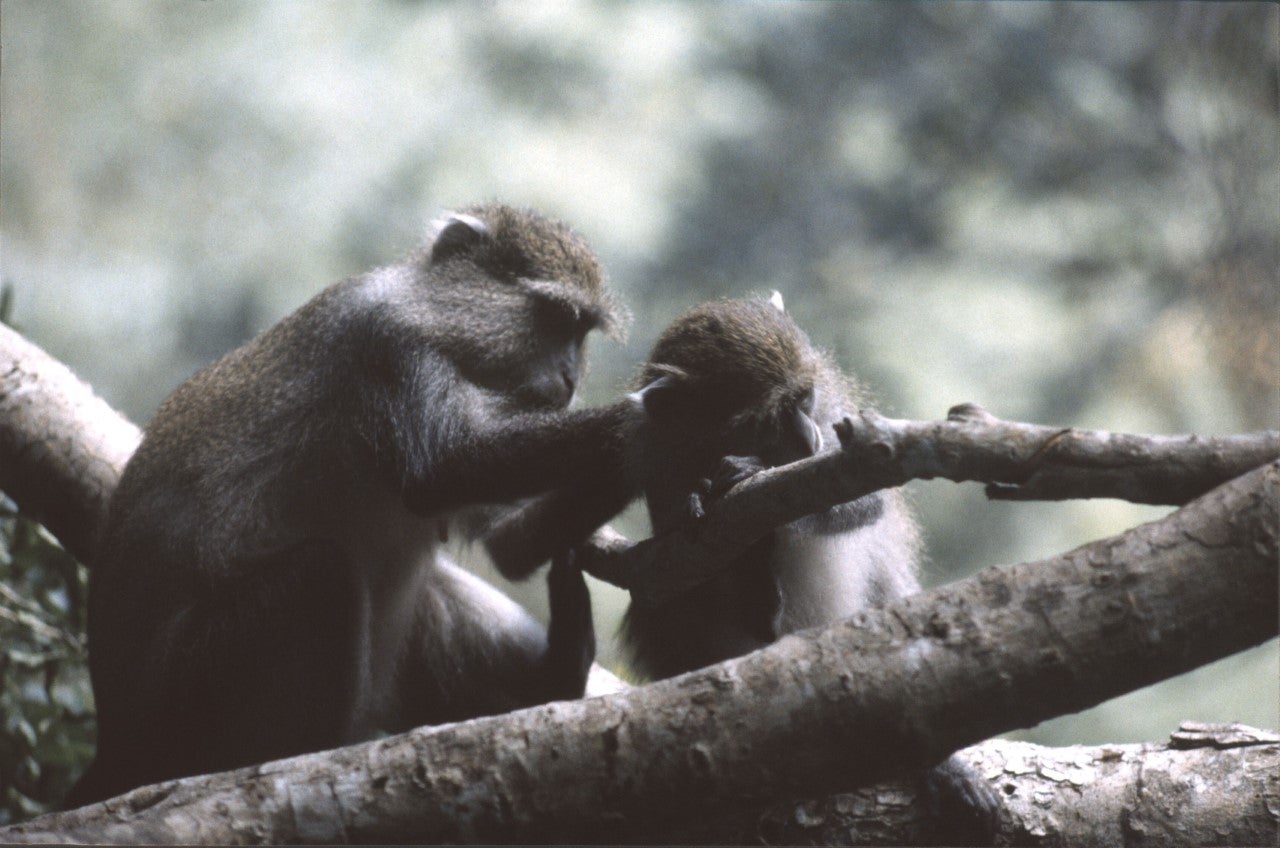Want to be successful in love and dating? Copying monkeys could help
When samango females want a change of main man, they head off into the forest to solicit new talent –and they have the power to initiate a male troop takeover


As I perch amongst a clump of Isoglossa stems I train my binoculars on a female samango monkey I’ve named Pica. I’ve followed her through the forest, a long way from the rest of her troop, and now she’s cautiously approaching a rather sleek, fit-looking samango male who I’ve never seen before. As she gets up close to him, Pica proffers her backside while vigorously shaking her head, which in samango-ese means “take me now”. And so he does.
I’m in the thick dune forest of KwaZulu Natal, in South Africa, studying the mating strategies of these monkeys, and Pica’s behaviour is significant because it’s not something she’s “supposed” to be doing.
Samangos live in troops that include a bunch of adult females, and just one adult male who looks like he’s in charge – and fights off any other ardent and hopeful males who happen to come by. When I started my research in the mid-1990s, the female monkeys were thought to be pretty much passive prizes of male competition.
But I discovered that in fact, when samango females want a change of main man, they head off into the forest to solicit new talent –and they have the power to initiate a male troop takeover.
Sadly, my monkey days are long gone, but in the intervening years I’ve been finding ways to apply behavioural research findings to help human females understand and improve their own situations.
What Pica and the other female monkeys demonstrate is the power of proactivity in choosing their mates – something we could all learn a thing or two about.
Like our monkey sisters, human females have agency and choice – at least in relatively liberal parts of the world. We have the power to choose a mate on the basis of qualities we know will work for us. But so often we don’t use it.
Let me explain. My current focus is helping women in midlife to find the man they need for a great relationship – and I’ve discovered a lot of women expect “the one” to somehow miraculously appear on the doorstep. They say things like, “if it’s meant to be, it will be”.
Sorry, but I’m pretty sure that’s bullsh*t. I mean… by what mystical process is this going to happen?
Many women see it as the man’s “job” to seek them out, to make an approach. Really? It’s the 21st century. And if we only select from those who get in our face, we’re limiting our options to the type of guy who, well… gets in our face, and that’s probably not good.
And then, even if we do get together with someone, we usually leave it up to our gut instinct to guide us, or to “chemistry”, and that can lead to some pretty bad choices. I should know – I’ve not had the greatest success with relationships in big parts of my life.
As an evolutionary biologist, I can see where at least part of the problem with this lies. Our gut instinct – our desires – evolved back in the stone-age, when women needed different things from relationships. Back then, the attributes to value were brute strength and status; as this signified a guy who could “get” stuff and protect you and the kids.
Nowadays, we’d do well to consciously override our evolved instincts – and figure out ways to make better relationship decisions that suit us in the modern world, and for the stage of life we’re at (well, that’s the conclusion I came to after years as a single mum trying to negotiate online dating, and never managing to find someone who wanted the same things as I did).
I knew I had to change the way I was looking for love. I’d been researching and writing about our evolved behaviour for years and then finally it clicked: I already had the answers I needed.
So, I started applying what I know about science to my relationship decision-making. And hurray – I found the true love of my life – and I married him. If I’d stuck with my old selection habits I know I’d never have given him a chance. So, what did I do?
First, I made sure I understood the type of partner I needed. Like a lot of women, I’d been going for guys with a bit of an edge, fairly competitive and dominant – these qualities can seem sexy at the start, but they don’t always signify a personality that’s good for long-term contentment. For that, you need someone who’s considerate, empathetic, someone who’ll try to make you happy every day and inspires you to reciprocate.
I also needed to be a bit patient. Not feeling the spark with the person you’re dating? Give it time. Research shows that when we really like someone, we gradually come to find them physically more attractive; and we come to desire them. It’s also important to find your partner’s area of confidence. When I met my partner I knew I liked him, but it wasn’t until I heard him play and sing in a ukulele session at the pub – and totally own the place – that I really got the hots.
Thirdly, don’t be bland. We – particularly women – often try to mould ourselves into some notional, appealing-to-all attractiveness; perhaps concerned that our fierce independence or obsession with astrophysics (or whatever it is) will put people off. It will put a lot of people off for sure. Who cares? Some will love your unique thing. Own your quirks.
But most of all, use your power. Make opportunities to meet someone. Don’t expect the universe to deliver someone magically – it’ll probably serve up the wrong one. You need to actively select your partner for the right qualities.
So, when you meet someone, instead of asking yourself “do they like me?”, “how can I be attractive to them?”; it should actually be, “is this person showing up for me?”; and, “is he/she capable of being the kind of partner I need for the relationship I want?”
Samango monkey girls get the mate they want using their agency and active choice. Be like a samango monkey girl.
Dr Mairi Macleod is an evolutionary biologist and an expert on dating for women in midlife. Her program, “How to Find the Man You Need”, is open now
Join our commenting forum
Join thought-provoking conversations, follow other Independent readers and see their replies
Comments
Bookmark popover
Removed from bookmarks